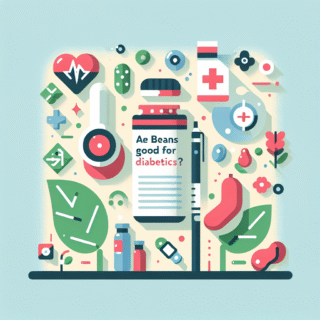
More Heart Disease, Stroke and Diabetes Articles
Are Beans Good for Diabetics?

If you’re wondering whether beans good diabetics should eat can help manage blood sugar, the short answer is: in most cases, yes. Beans are a nutrient-dense, affordable food rich in fiber, plant protein, vitamins and minerals. For people asking are beans good for a diabetic and are beans good for diabetes in general, research shows that including legumes in a balanced meal plan can support steady glucose levels and overall metabolic health when eaten in appropriate portions.
Beans Good for Diabetics: how legumes affect blood sugar
Legumes—such as lentils, black beans, chickpeas and navy beans—tend to have a low to moderate glycemic index and are high in soluble fiber. That means they slow digestion and the absorption of carbohydrates, which can reduce post-meal blood sugar spikes. For those asking is beans good for diabetes, the combination of fiber and plant-based protein makes beans a smart option to replace more refined carbs or high-fat animal proteins in some meals.
When considering which beans are good for diabetes, focus on whole, minimally processed varieties. Dry beans cooked from scratch or low-sodium canned beans are preferable to baked beans or heavily sweetened legume dishes. Portion control matters: a typical serving of cooked beans is about 1/2 to 3/4 cup depending on your meal plan and carbohydrate goals.
Nutritional benefits and practical tips
Beans good for diabetes management provide several advantages:
- Fiber: Soluble fiber helps blunt glucose absorption and supports gut health.
- Protein: Plant protein helps you feel full and can reduce overall calorie intake.
- Micronutrients: Iron, magnesium and potassium in beans support metabolic and cardiovascular health.
Preparation matters. Rinsing canned beans lowers sodium, and combining beans with non-starchy vegetables and a source of healthy fat (olive oil, avocado, nuts) can further moderate blood sugar response. For people concerned about digestive discomfort, gradually increasing intake and using proper soaking and cooking methods can reduce gas and bloating.
Which beans are best and how to fit them into meals
Which beans are good for diabetes? Generally, lentils, black beans, pinto beans, chickpeas (garbanzo beans), and kidney beans are excellent choices. Split peas and navy beans also offer a lot of fiber and nutrients. Incorporate beans into salads, soups, stews, or as a side instead of refined grains. A cup of lentil soup or a salad with 1/2 cup of chickpeas can be a satisfying, blood-sugar-friendly option.
Pay attention to mixed dishes: some bean-based products or recipes add sugar, excessive salt, or saturated fats. If you use canned or ready-made options, read labels carefully. Pairing beans with fiber-rich vegetables and lean proteins helps balance the meal and keeps blood sugar more stable.
Special considerations for people with diabetes
Even though beans are often recommended for people with diabetes, individual responses vary. Monitor your blood glucose after trying new meals to see how different types and amounts of beans affect you personally. If you use insulin or other glucose-lowering medications, discuss changes in carbohydrate intake with your healthcare provider to adjust doses if needed.
For broader cardiovascular considerations—which are important because diabetes raises heart disease risk—regular heart health monitoring is wise. Learn more about why regular cardiology check-ups matter for people with diabetes in this article about heart care and diabetes.
When looking for reputable guidance on diet and diabetes, national health institutes provide evidence-based recommendations on healthy eating patterns and activity. For a reliable overview of diet, eating, and physical activity for people with diabetes, consult resources from government health agencies to complement advice from your diabetes care team.
- Takeaways:
- Beans are nutrient-dense and often beneficial for blood sugar control when eaten in appropriate portions.
- Choose whole or low-sodium canned beans and avoid added sugars or excessive fats in preparations.
- Monitor personal blood glucose responses and consult your healthcare team about adjusting medications or meal plans.
Q: Are beans good for a diabetic who is trying to lose weight?
A: Yes. Beans provide fiber and protein that increase satiety and can reduce overall calorie intake when used to replace higher-calorie, lower-fiber foods. Pay attention to portion sizes and preparation methods to support weight loss goals.
Q: Are beans good for diabetes when eaten every day?
A: Eating beans regularly can be part of a healthy pattern, but variety is important. Rotate different legumes and other protein sources, and balance your plate with vegetables, healthy fats, and whole grains based on your individualized nutrition plan.
Q: Is beans good for diabetes if I have digestive issues?
A: Some people experience gas or bloating when they start eating more legumes. Gradually increase intake, try soaked/cooked beans or canned varieties that are easier to digest, and consider cooking methods like pressure cooking to reduce discomfort. If issues persist, consult a dietitian or clinician.
External resource: For evidence-based guidance on diet and physical activity for diabetes, see the National Institute of Diabetes and Digestive and Kidney Diseases (NIDDK) guidance at NIDDK: Diet, Eating, and Physical Activity.
Internal resource: For information about the intersection of heart disease, stroke and diabetes care, read our piece on regular cardiology check-ups and heart health.














